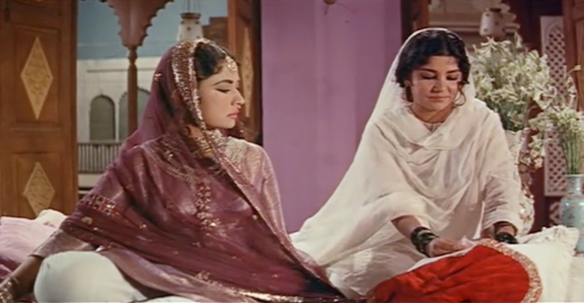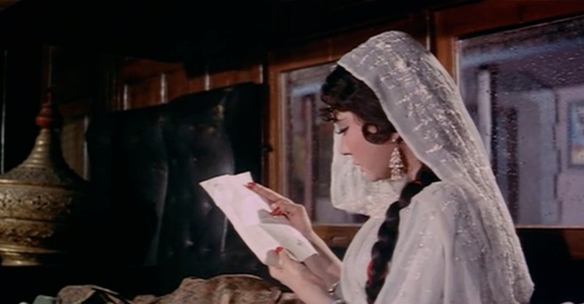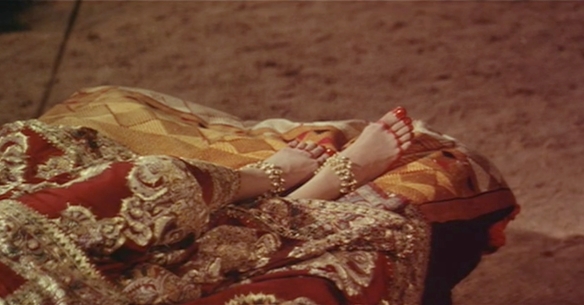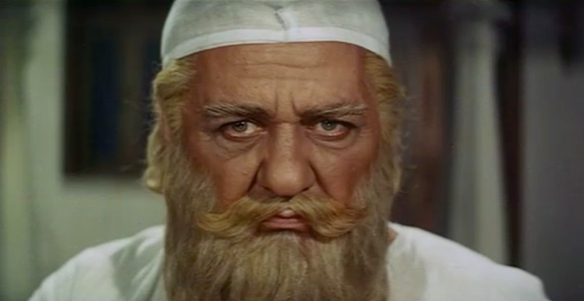Now we will explore some classic Pakeezah dialogue, quotes and their English translations from the timeless 1971 film. I think it’s pretty clear that we’re obsessed with this movie. We’ve discussed the making of the film and its songs, but let’s take a moment to appreciate Pakeezah’s dialogue for which there is truly no comparison outside of the ode to spoken Urdu poetry that is Mughal-e-Azam (1960).
“Aapke paaoo.N dekhe. Bahut haseen hai.N. Inhe zameen par mat utariiyega. Mele ho jaaye.Nge –Aapkaa ek humsafar…”
[“I have seen your feet. They are beautiful. Please do not place them on the ground. They will become dirty. –A fellow traveler…”]
I have to give a caveat: although we have provided a full English translation of these Pakeezah dialogues, I think the true poetry is lost outside of the Urdu language. Written by Kamal Amrohi himself, the exquisite dialogue of Pakeezah transports you to a languid surrealist fantasy. Among other questions, you may ask did people really talk like that? Do men as devastatingly charming as Raajkumar exist in real life? How fake is that blonde wig from the opening scene, seriously?
Although some of these will remain unanswered, let us now look closer at 3 of my favorite gems of Pakeezah dialogue and English translations that will be sure to get your heart rate up.
“Ek har raat, teen baje. Ek rail gaadi apni patriyon se utar gayii, aur meri dil se guzarti hai...“
[“Every night, when the clock strikes 3, a train leaves its rails and passes through my heart…”]
The first dialogue comes days after Pakeezah has received Rajkumar’s love letter. She is restless and can no longer focus on her work. Pakeezah confesses the reason for her behavior to her friend, who reacts famously against indulging such dreams. It’s a heartbreaking scene made artful by the grace of the Urdu language. Also please look at those sets and tell me there are architects in America who know how to build them.
PAKEEZAH: Bahut dino.N se, mujhe aisaa kuch lagtaa hai jaise mai.N badaltii jaa rahii hoo.N. Jaise mai.N kisi anjaane safar mei.N hoo.N aur kahii.N jaa rahii hoo.N. Sab kuch chuuTa jaa raha hai. Sahib Jaan bhi mujhse chuuT rahe hai.N, aur mai.N Sahib Jaan se duur hoti jaa rahi hoo.N.
[PAKEEZAH: For many days now, I feel as if I am changing. As if I am on an unknown journey and going somewhere. Everything is going away from me. Sahib Jaan is even leaving me, and I am going far from Sahib Jaan.]
SAHELI: Kaun hai yeh?
[SAHELI: Who is he?]
PAKEEZAH: Kaun?
[PAKEEZAH: Who?]
SAHELI: Yehii. Jisse mai.N pooch rahi hoo.N. Bataao!
[SAHELI: Him, whom I am asking about. Tell me!]
PAKEEZAH: Kya bataaoo.N kaun hai? Ek ajiib waaqaaya hai.
[PAKEEZAH: What should I say about who he is? It is a strange tale.]
SAHELI: Kya?
[SAHELI: What?]

PAKEEZAH: Ek har raat. Teen baje. Ek rail gaadi apni patriyon se utar gayii, aur meri dil se guzarti hai. Aur mujhe ek paighaam de jaati hai.
[PAKEEZAH: Every night at three o’ clock, a train leaves its rails and passes through my heart. And it gives me a message.]
SAHELI: Sahib Jaan, yeh paighaam tere liye nahii.N.
[SAHELI: Sahib Jaan, this message is not for you.]
PAKEEZAH: Kyaa? Nahii.N, nahii.N. Yeh mere hii liye hai. Is se mai.N ne apni hi paaoo.N mei.N rakhaa huaa payaa tha.
[PAKEEZAH: What? No, no, this is for me. It had been placed on my feet.]
SAHELI: Haa.N. Lekin us waqt tere paaoo.N mei.N ghungroo bandhe hue nahii.N ho.Nge. Agar ghungroo bandhe hue hote, to yeh kaise koi kahta ki paaoo.N ko zameen par mat rakhna? Maile ho jaaye.Nge? Merii jaan, yeh paighaam to hai. Lekin bhatak gayaa hai.
[SAHELI: Yes. But at that time, you’re feet were not bound by ankle bells. If they had been bound in ankle bells, how could anyone say “do not place your feet on the ground”? “They will become dirty”? My dear, this is certainly a message, but it is misguided.]

Tragic, right? My next favorite scene comes when Pakeezah has inadvertently landed inside Rajkumar’s own tent. She senses him approaching, and pretends to be asleep. Rajkumar bursts in with an appropriate flush of theme music to accompany him.
Pakeezah panics and the audience enters into her thoughts as she narrates her feelings in this beautiful moment of love and fear.
“Allah! Woh mere paas khade hai.N. Aur meri jaan nikal jaa rahi hai. Aap yuu.N hii hairaan hairaan mujhe dekhte rehe.Nge. Mai.N taraste taraste, bina aapko ek nazar dekhe, mar jaaoo.Ngii. Aap hi ke samne, aap hi ke bistar par khatam ho jaaoo.Ngii. Zara muu.N phenk lijiye. Mai.N ek saa.Ns leloo.N! Ek chalak aapke dhekh loo.N!”
[“God! He is standing near me. And I feel as if I am dying. You will continue to stare at me in surprise, and I will slowly die without glancing at you even once. Beside you, on your bed itself, I will be finished. Please turn your face away so that I can take a breath! Let me take just a glimpse of you!’]
I can’t get enough of this scene–her words are so poetically expressed, but so vividly capture the anxiety of the moment!
“Afsos ki log duudh se bhi jal jaate…”
[“How unfortunate that people are burned even by mere milk…”]
The last epic dialogue I’ll discuss comes when Rajkumar brings Meena Kumari home for the first time. Do arguments really happen like that? In my house, an argument never devolves into an Urdu poem–but then again, we don’t have those outfits on.
HAKIM SAAB: Salim, woh kaun hai?
[HAKIM SAAB: Salim, who is this?]
SALIM: Woh ek gumnaam ladki hai.
[SALIM: She is a lost girl.]
HAKIM SAAB: To woh tumhaare saath hai?
[HAKIM SAAB: She is with you?]
SALIM: Jii.
[SALIM: Yes.]
HAKIM SAAB: Yaani?
[HAKIM SAAB: Meaning?]
SALIM: Yeh kaun hai, mai.N bhi nahii.N jaantaa. Yeh ek mazluum ladki ki jo apni aadaash kho chukhi hai. Aur itefaaqan woh meri panaah mei.N aa gayii hai.
[SALIM: Who she is, even I don’t know. She is an oppressed girl who had lost her memory. And by chance, she came into my care.]
HAKIM SAAB: Lekin, tumhaare is bayaan par, kaun yaqeen karegaa?
[HAKIM SAAB: But who will believe this tale of yours?]
SALIM: Mujhe iski parva nahii.N
[SALIM: I am not worried about that.]
HAKIM SAAB: Tumhe nahii.N, lekin hame.N iski parva hai. Jo log duudh se jal jaate. Woh chaas bhi phoonk phoonk kar piite.
[HAKIM SAAB: You may not be, but I am. Those people who are burned by milk, drink even the froth with caution.
SALIM: Afsos ki log dhuudh se bhi jal jaate.
[SALIM: How unfortunate that people are burned even by mere milk.] Oh my God, such a good comeback! So poetic, so simple. I die.
HAKIM SAAB: Tum humse bahaz karna chaahte ho? Humse bahaz karne ki zaruurat nahii.N. Aisii ladkii jiskaa koi naam nahii.N, pathaa nahii.N, woh kyuu.N tumhaare saath hai?
[HAKIM SAAB: You want to argue with me? There is no need to argue. A girl with no name, no address, why is she with you?]
SALIM: Isliye ki woh merii panaah mei.N aayii. Aur yeh koi gunaah nahii.N.
[SALIM: Because she came under my care. And that is no crime.]
HAKIM SAAB: Gunaah to nahii.N. Lekin ismei.N hamaarii badnaami hai.
[HAKIM SAAB: It is not a crime. But I could be dishonored from it.]
SALIM: Jii nahii.N, agar is mei.N koi badnaamii hai, to merii hai.
[SALIM: No, if anyone is dishonored, it is me.]
HAKIM SAAB: Tum kaun ho? Kya humko tumhaara koi rishtaa nahii.N?
[HAKIM SAAB: Who are you? Do you have no relation with me?]
SALIM: Jii hai. Lekin is maumle se aapkaa koi taluk nahii.N.
[SALIM: Yes, I do. But this matter does not concern you.]
HAKIM SAAB: Humaare koi taluk nahii.N?? Agar hamaaraa koi taaluk nahii.N. To phir tum apnii yeh badnaamii hamaare ghar kyuu.N le aaya ho?
[HAKIM SAAB: It does not concern me?? If it does not concern me, then why have you brought this dishonorable girl to my house?]
SALIM: Beshak mujhse ghalati huii. Mai.N bhuul hi gayaa tha. Is ghar ke insaano.N ko har saa.Ns ke baad doosre saa.Ns lene ki ijaazat aapse lenii padhtii hai. Aur aapki aulaad khuda ki banaaii hui zameen par nahii.N chaltii, aapki hatheli par rehti hai.N
[SALIM: Undoubtedly, I have made a mistake. I had forgotten that in his house, after every breath people must ask your permission to take the second. And that your children do not walk on the earth that God made, but live in the palm of your hand.]
Whoa. How do metaphors that awesome just come to you like that? I need to re-evaluate how I insult people. Why do these kinds of situations never happen to me?
As a small note, I just think the one-liner the head aunt says before the song “Chalte Chalte” is pretty sweet. When no one else shows up that night because the rich client has scared them all off, she graciously says to him,
“Log nahiin.N aaye, to na sahii. Sitaaron ki raat se, ek chaandni raat mei.N to kai zyaadaa roshni hoti hai.”
[“Other people did not come, so be it. In a moonlit night there is more radiance than in a night of stars.”]
Wah wah! The movie is teeming with pearls like this!
What is YOUR favorite dialogue from Pakeezah? Let us know in the comments! For more dialogues, check out our post on the beauty of Urdu in classic Bollywood film!
-Mrs. 55









